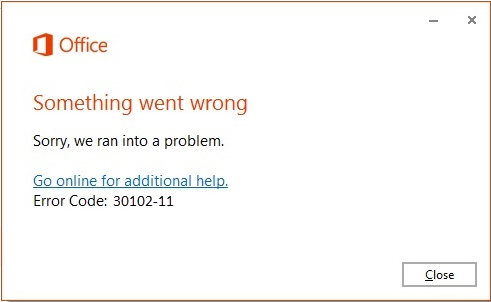You might see these errors if there was an operating system error or you're running low on disk space. Here are some things you can try to fix the problem. We've listed the most common solutions first, so try them in order.

1 - Clean up your disk space
-
For Windows 10, go to Free up drive space in Windows 10.
-
For Windows 8/8.1 and Windows 7, go to Tips to free up drive space on your PC.
2 - Restart your device and try to install Office again
To reinstall Office select the version you want to install and follow those steps.
Microsoft 365
Office 2021
Office 2019
Office 2016
Office 2013
3 - Verify that you have the latest Windows updates installed
Follow the steps in Update Windows 10 article.
4 - Run system file checker tool to repair missing or corrupted system files
For more information about the system file checker tool, see Use the System File Checker tool to repair missing or corrupted system files.
Select your operating system from below.
-
Right-click Start, and then select Command Prompt (Admin).
-
At the command prompt, type the following command and press Enter.
sfc/scannow
-
When the system scan is complete, try to install Office again.
-
Swipe in from the right edge of the screen, and then tap Search. (If you're using a mouse, point to the upper-right corner of the screen, move the mouse pointer down, and then click Search.)
-
Type command prompt in the search box.
-
In the list of results, swipe down or right-click Command Prompt, and then tap or click Run as administrator.
-
In the Administrator: Command Prompt window, type the following command and press Enter.
dism /online /cleanup-image /restorehealth
-
When the system scan is complete, try to install Office again.
-
Click Start > All Programs > Accessories, and then right-click Command Prompt and select Run as administrator.
-
At the command prompt, type the following command and press Enter.
sfc/scannow
-
When the system scan is complete, try to install Office again.
5 - Refresh Windows (Windows 10, 8.1)\Perform an in-place upgrade (reinstallation) (Windows 7)
-
Select the Start button (lower-left corner), and then select Settings.
-
Select Update & security > Recovery.
-
Under Reset this PC, select Get started.
-
Choose the option Keep my files, and follow the instructions on the screen.
Follow the steps in the How to refresh, reset, or restore your PC article.
Follow the steps in the How to Perform an In-Place Upgrade on Windows Vista, Windows 7, Windows Server 2008 & Windows Server 2008 R2 article.
No comments:
Post a Comment